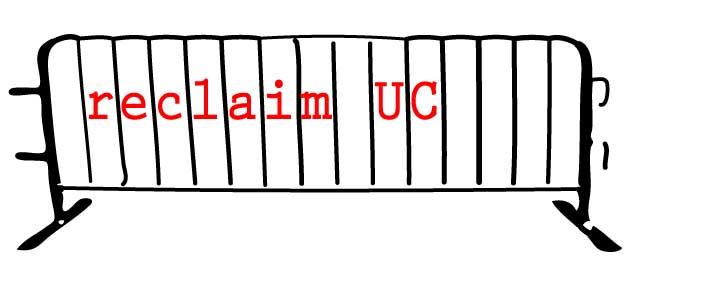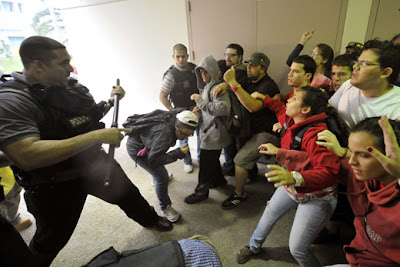
Leaders of the university’s governing board ousted Sullivan last week largely because of her unwillingness to consider dramatic program cuts in the face of dwindling resources and for her perceived reluctance to approach the school with the bottom-line mentality of a corporate chief executive. . . . Besides broad philosophical differences, they had at least one specific quibble: They felt Sullivan lacked the mettle to trim or shut down programs that couldn’t sustain themselves financially, such as obscure academic departments in classics and German.This detailed analysis of the situation, by Doctor Cleveland, outlines three specific areas that the Board of Visitors was pushing: 1) online education; 2) high-profile faculty recruitment; and 3) "Program Prioritization," in other words shifting funds from certain unfavored programs to other favored programs that the Board has deemed more valuable -- despite the fact that these programs are actually less profitable. "Program prioritization allows the central administration to take money from profitable units and redirect it to unprofitable units that the administration favors."
All of this, of course, resonates strongly with the policies that the UC administration and the UC Regents have sought to implement since the 1990s and at an accelerated pace over the last decade. Programs like "Operational Excellence" serve as a framework through which the administration can cut salaries and fire workers in the name of "streamlining" and "efficiency," while giving themselves raises and hiring ever more "deans, deanlets, and deanlings" who fill the bloated bureaucratic ranks to the point that senior managers now officially outnumber faculty at the UC. Academic programs have been cut and consolidated, class sizes have increased, out-of-state students are being accepted at higher rates, and everybody's tuition is skyrocketing.
But there's an important point from the experience of anti-privatization struggle at the UC that has so far been missing from the discussion. One of the earliest articles published on the topic, by UVA professor Siva Vaidhyanathan, accurately likened the Board of Visitors to "robber barons" who have "tr[ied] to usurp control of established public universities to impose their will via comical management jargon and massive application of ego and hubris." (These words would do equally well slapped across the foreheads of Dick Blum et al.) But Vaidhyanathan frames his argument as a defense of President Sullivan:
Sullivan is an esteemed sociologist who specialized in class dynamics and the role of debt in society. The author or co-author of six books, she spent most of her career rising through the ranks at the University of Texas, where she served as dean of the graduate school while I was working toward my Ph.D. in the late 1990s. She was known around Texas as a straightforward, competent, and gregarious leader. She carried that reputation from Texas to the University of Michigan, the premier public research university in the world, where she served as the chief academic officer, or provost, for four years.Sullivan, in other words, is the administrator's administrator. Since the 1990s, she has occupied increasingly senior administrative positions at UT Austin and University of Michigan before being hired by UVA. Vaidhyanathan lists these positions as a way of praising Sullivan's qualifications, but the dark underside of his story is that these flagship universities are precisely the ones that have implemented some of the most wide-ranging privatization policies over the last two decades -- precisely when Sullivan was entering into the administrative ranks. It's no coincidence that Mark Yudof was dean from 1984-1994, then executive vice president and provost from 1994-1997 at UT Austin, before becoming chancellor of the University of Minnesota then president of the UC. And the University of Michigan has become a model for the privatization of public research universities across the country.
When the University of Virginia sought a president to lift it from the ranks of an outstanding undergraduate school to a research powerhouse, while retaining its commitment to students and the enlightenment Jeffersonian traditions on which it was founded, the board selected Sullivan in 2010. She became the first woman to serve as president of UVA, a place she could not have attended as an undergraduate in the 1960s because it was all-male at the time.
Sullivan's own policies may not have been too far out of line with the austerity agenda of our own UC administration. Vaidhyanathan writes, once again intending it as a compliment, that once established at UVA "she had her team and set about reforming and streamlining the budget system, a process that promised to save money and clarify how money flows from one part of the university to another. This was her top priority. It was also the Board of Visitor’s top priority." She may have had different ideas about how to go about making these cuts, but at the end of the day her agenda also turned on its own set of cutbacks.
Furthermore, over the last two years, that is, in each year of her term, President Sullivan has overseen substantial tuition increases: 9.9 percent for in-state students (6 percent for out-of-state) in 2011, and another 8 percent for in-state (6.9 percent for out-of-state) in 2012. In a familiar twist, part of the money raised from the tuition hikes went directly to fund the operation of new buildings. In total, that made eight consecutive years of tuition increases of "somewhere below 10 percent."
No doubt real tensions existed between Sullivan and the Board of Visitors. And it seems clear that, beyond "philosophical differences," these tensions had to do with divergent views regarding what was seen as the appropriate pace of and sites for cuts. But for those of us on the ground at the UC, the public response -- calls to "reopen discussion" about Sullivan's resignation, even votes of no confidence in the Board of Visitors' decision -- seems somewhat misdirected. The removal of the president was sketchy as hell and the Board of Visitors is clearly corrupt, but the answer to the university in crisis is not more or even "better" administrators. "Better" administrators just mean that the implementation of privatization is smoother, if slower. But at the UC we have learned that it is a mistake to think of administrators as individuals: "This struggle against the administration is not about attacking individuals -- or not primarily. It is about the administrative logic of privatization, and the manner in which that logic is enforced." Sometimes this logic is enforced by riot cops, other times by billionaires on the Boards of Visitors. Sullivan's ouster must be read as a necessary result of this administrative logic, the same pressures that push administrators across the country to adopt, implement, and enforce similar policies. Once begun, privatization demands continual blood. But if Sullivan were to return to office, she would face the same economic pressures and would be forced, sooner or later, to accede to them.
The argument is structural; that the administrator plays, and must play, a particular role in the management of the late capitalist university. It's not by chance that across the US all universities (certainly all public universities) are moving in the same directions: massive tuition hikes and corporate fund-raising campaigns, new construction projects to bring in grants and rich students, worker layoffs while adding to the bloated ranks of the administration. If the capitalist is capital personified, the late capitalist administrator is the personification of austerity.
The only way to stop the privatization of the public university is to take it back from the administrative class whose existence depends on its continuation.
NO REGENTS / NO VISITORS / NO CAPITAL / NO BOSSES




















 Today the UC regents officially voted to once again
Today the UC regents officially voted to once again